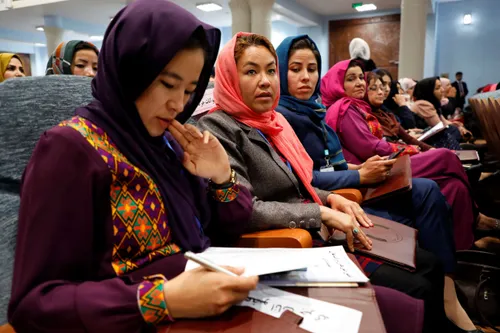
ISLAMABAD —
The Taliban on Saturday ruled out any discussions on “internal issues” of Afghanistan, including women’s rights, with international envoys at a crucial United Nations-hosted meeting in Doha, Qatar.
Zabihullah Mujahid, the Taliban government spokesperson and head of its delegation attending the conference in the capital of the Gulf state, said before his visit to Doha that the two-day talks commencing Sunday would primarily center on Afghan economic issues and counternarcotics efforts.
“We acknowledge women are facing issues, but they are internal Afghan matters and need to be addressed locally within the framework of Islamic Sharia,” Mujahid told a news conference in the capital, Kabul, when asked whether Afghan women’s rights would be on the meeting agenda.
“Our meetings, such as the one in Doha or with other countries, have nothing to do with the lives of our sisters, nor will we allow them to interfere in our internal affairs,” he noted.
Special envoys from around two dozen countries, including the United States, will gather in Doha Sunday to interact with Taliban representatives for the first time since U.N. Secretary-General Antonio Guterres initiated what is referred to as the “Doha process” a year ago.
The dialogue is aimed at developing a unified and coherent international approach to increase engagement with the fundamentalist Afghan authorities.
The Taliban stormed back to power in August 2021 as the U.S.-led foreign forces departed the country after almost two decades of involvement in the Afghan war. They have imposed their harsh interpretation of Islamic law, banning girls from schools beyond the sixth grade and many Afghan women from public and private workplaces, including the U.N., among other restrictions on their freedom.
The international community has refused to formally recognize the male-only Taliban government until it removes the restrictions on women and girls.
The Taliban defend their governance, saying it is aligned with Afghan culture and Islamic law. They were not invited to the first Doha meeting in May 2023, and they refused an invitation to the second in February. Both events were hosted by Guterres himself.
The U.N. is under fire for excluding women Afghan representatives from Sunday’s talks. The decision has triggered outrage among global human rights groups and female rights advocates, who argue that the Taliban’s curbs on women and girls should be a central focus of any discussions about the future of Afghanistan.
Mujahid defended the decision to skip previous Doha talks, saying Taliban representatives were invited only for limited interactions and they were refused a meeting with the U.N. secretary-general.
He said that other groups promoting “violence and disharmony” in Afghanistan also were invited to those sessions as representatives of the country despite Taliban objections. “Now the [Taliban] conditions have been accepted that this time it will not happen,” Mujahid claimed.
The U.N. spokesperson announced on Friday that Rosemary DiCarlo, its undersecretary-general for political and peacebuilding affairs, will host the Doha meeting of special international envoys on behalf of Guterres and raise women’s issues.
In addition, Stephane Dujarric told reporters in New York that DiCarlo and special international envoys will meet on Tuesday with representatives of Afghan civil society, including human rights and women’s organizations and advocates — a day after the two-day session with the Taliban ends.
“The undersecretary-general will raise the rights of women and girls, human rights in general, and political inclusion in the discussions in Doha that she will be having with the de facto [Taliban] authorities,” Dujarric said.
“The ultimate objective of the process is an Afghanistan at peace with itself and its neighbors, fully integrated into the international community and meeting its international obligations, including on human rights, and particularly on the rights of women and girls,” Dujarric said.
Mujahid insisted that the Taliban’s participation in Sunday’s Doha meeting would mutually benefit Afghanistan and the world and help restore the country’s dialogue with the West.
The U.S. and Western countries at large have isolated the Taliban over their harsh treatment of Afghan women and other human rights concerns. They moved their diplomatic missions to Doha after the Taliban takeover, terminated economic development aid for the country, and isolated the Afghan banking sector over terrorism-related sanctions on many leaders of the de facto government in Kabul.
However, most of Afghanistan’s neighbors, including China, Iran and Pakistan, and many regional countries such as Russia and Turkey have retained their embassies and increased diplomatic engagement with the Taliban.
The Taliban maintain they have restored peace in war-torn Afghanistan, and their crackdown on narcotics, including a nationwide ban on poppy cultivation, has almost ended illicit drug production in the country.
The U.N. has endorsed those claims, stating that the prohibition has resulted in a 95% decrease in drug production in a country that was previously the world’s largest producer.








